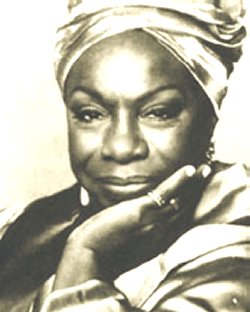|
NINA SIMONE (1933 - 2003)
An inspirational performer of protest, jazz, soul, pop, blues, folk and rock songs; she defied easy classification.
Nina Simone was born Eunice Kathleen Waymon on February 21st, 1933 in Tryon, North Carolina, the sixth of eight children, four boys and four girls. Early on in life she revealed a prodigious musical talent playing the piano and singing in the local church with her sisters in their mother's choir. At the age of 6, a benefactor paid for her first piano lessons. Eunice made so much progress that in 1943 she gave her first piano recital at the town library. There she not only experienced her first applause, but also had her first encounter with racism: during the recital her parents were removed from the first row to accommodate some whites. This episode was a traumatic experience for her and may be the origin of her commitment to the fight for freedom and civil rights.
With the financial help of some local supporters, Eunice left North Carolina in 1950 to continue her musical education at the Juilliard School of Music in New York, the same school that Miles Davis attended. After New York her family moved to Philadelphia. She tested for a scholarship at the prestigious Curtis Institute in Philadelphia but was rejected, ostensibly for musical reasons, but probably for her colour. Feeling discouraged, in order to support herself and pay for further lessons she became an accompanist for a singing teacher. Later, in 1954, she took a job as a singer-pianist in the Midtown Bar and Grill in Atlantic City, adopting the stage name of Nina Simone: Nina (which means "girl" in Spanish) from a pet name that a boyfriend gave her, and Simone from the French actress Simone Signoret.
It was at the Midtown Bar, where Nina Simone sang, played and improvised, that her career took off. Subsequently she played in several Philadelphia clubs. Recognized as a talented pianist, she was given a recording session with Bethlehem Records in 1957. Her debut album, was a great success, first in Philadelphia and New York and then in the whole US. A single released from that LP, 'I Loves You Porgy', became a national r & b hit in the summer of 1959. Thirty years later, 'My Baby Just Cares for Me', another selection from the same album, was adopted as the theme for a TV advert for Chanel No 5 perfume and reached #5 on the UK charts.
Thanks to the success of her first recordings, in 1959 Simone signed with Colpix. She recorded 10 albums while signed to the label: six studio and four live. Her eclectic Colpix catalogue included blues standards like 'Nobody Knows You When You're Down And Out' and 'Trouble In Mind'; movie soundtrack songs such as 'Wild Is The Wind', 'Sayonara' and 'Samson And Delilah'; and 'Come On Back, Jack', and answer-song to Ray Charles' 'Hit The Road, Jack'. Nina married New York detective Andy Stroud in 1961 and gave birth to their daughter Lisa Celeste Stroud the following year. Her interpretation of the traditional 'The House Of The Rising Sun' preceded those by Bob Dylan, who recorded the same song on his 1962 debut album, and the Animals, whose version topped the American and English charts two years later.
In 1964 Nina join the Philips label, an association that lasted for three years and seven albums. One of the first songs cut during this period was 'Don't Let Me Be Misunderstood', subsequently covered by the Animals. And when, in 1965, Nina released 'I Put A Spell On You', a song by Screamin' Jay Hawkins from 1956, the number was immediately covered by the Alan Price Set, the group founded by organist Alan Price after his departure from Animals. It was at Philips that Nina wrote the celebrated 'Mississippi Goddam', her first song of protest, written after the 1963 murders of Medgar Evers in Mississippi and four black schoolchildren in Alabama.
Nina switched to RCA in 1966, a deal negotiated by her husband who acted as her manager to whom some Simone compositions were mis-credited. At RCA Nina recorded nine albums and some of her most popular songs. Her versions of 'Ain't Got No/I Got Life', a medley from the 60s musical Hair, and the Bee Gees' 'To Love Somebody' were big hits in Britain. Nina's 'To Be Young, Gifted And Black', inspired by a play of the same name written by her friend Lorraine Hansberry, was recorded by Aretha Franklin in 1972.
Embittered by racism, Nina renounced her homeland in 1969 and became a wanderer, roaming the world. She lived in Liberia, in Barbados, Switzerland, France, Trinidad, the Netherlands, Belgium and UK at various times. In 1970 she and Stroud split up and Nina attempted to manage her own career. In 1978 she was arrested for withholding taxes in protest at her government's undeclared war in Vietnam. The same year she make the LP 'Baltimore' for CTI and in 1982 the 'Fodder On My Wings' album for a Swiss label. The 'Nina's Back' and 'Live And Kickin' In The US' sets followed in 1985.
The success of 'My Baby Just Cares For Me' in 1987 brought Nina back into the public eye. In 1992 her music was featured in the movie Point Of No Return, with the lead character using Nina as inspiration. The same year saw the release of her 'Let It Be Me' album on Verve Records. Nina moved to the southern French town of Bouc-Bel-Air near Aix-en-Provence in 1993. She died, aged 70, at her home in Carry-le-Rouet. Nina's close friend Miriam Makeba was at her daughter Lisa's side at her funeral.
Adapted from: http://www.boscarol.com/nina/html/manual/bio.html
Eunice Kathleen Waymon (Nina Simone); singer, songwriter, musician and political activist: born February 21, 1933 - died April 21, 2003.
